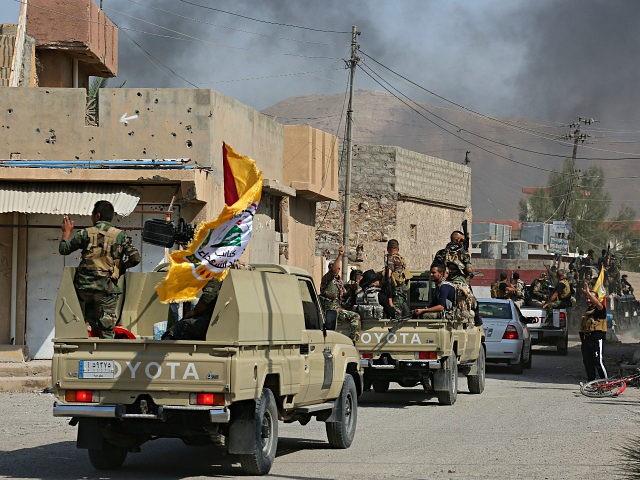The Kurdistan Regional Government (KRG) of Iraq announced on Wednesday that it would be open to “freezing” the results of the September referendum asking Kurds whether they would support the creation of a sovereign KRG state.
It remains unclear what the freezing of the referendum would mean, as the vote was non-binding and meant only to secure a mandate for dialogue on independence with the government in Baghdad. Despite the fact that the KRG has not declared independence and repeatedly denied any desire to unilaterally secede from Iraq, the Iraqi government and its Iran-backed Shiite militia allies invaded KRG territory this month, reclaiming the disputed, multi-ethnic city of Kirkuk.
The United States government opposed the referendum and has not defended the Kurdish government despite the ongoing attack. The KRG’s military, the Peshmerga, are among the most efficient U.S.-allied troops on the ground against the Islamic State today. The Popular Mobilization Forces (PMF)—the Iran-allied, mostly Shiite militias attacking Kirkuk—are reportedly using U.S. weapons to the attack the pro-American Kurds.
In a statement Wednesday, the KRG said they would “freeze the outcome of the referendum that was held in Iraqi Kurdistan” in exchange for opening dialogue and ending the invasion of their territory by the Iranian allies. According to a translation of this statement by the Kurdish outlet Rudaw, the KRG offered:
The immediate cessation of fighting and every kind of military operations in the Kurdistan Region.
Freezing the outcome of the referendum that was held in the Iraqi Kurdistan.
Beginning an open dialogue between the Kurdistan Regional Government and the federal government on the basis of the Iraqi constitution.
The statement adds that “a war between the two sides will not have a winner” and that the about-face on the referendum was necessary due to “dangerous situation and tension that faces Iraq and Kurdistan.”
It remains unknown whether the Iraqi government will accept the offer. Given that the purpose of the referendum vote was to begin a dialogue with Baghdad, the KRG has been demanding diplomacy since late September to no avail. Following the vote, Prime Minister Haider al-Abadi said in a televised speech, “we are not ready to discuss or have a dialogue about the results of the referendum because it is unconstitutional.” He then ordered troops into Kirkuk.
The Peshmerga published a separate statement on Tuesday accusing the PMF, also known as “Hashd al-Shaabi” of continuing attacks deeper into Kurdish territory than the disputed Kirkuk region. “The Popular Mobilization Forces’ (PMF) ongoing activities and persisting advance, and its disrespect for pre-established boundaries is a clear indication that they have harmful intentions and wish to violate the honor of the Kurdistan people,” the Peshmerga asserted. “In the aftermath of the events in Kirkuk Province and the advance of the Hashd al-Shaabi and Iraqi forces in all the disputed territories, it is obvious these forces do not respect any of the lines of contact agreed upon by both sides.”
The PMF reportedly began attacking areas near Rabia, on the Syrian border and far from the disputed Kirkuk region, this week.
The Peshmerga accusations precede the release of an Amnesty International report detailing attacks on civilians in Tuz Khurmatu this month, targeting non-Arab citizens. Witnesses told Amnesty that the most egregious crimes against civilians—burning down of houses, destruction of businesses, and looting—occurred in Kurdish-populated areas, suggesting the PMF or Iraqi military were responsible for the attacks.
“The Iraqi authorities already stated they would not tolerate any attacks against civilians, and would hold perpetrators accountable,” Lynn Maalouf, Director of Research for the Middle East at Amnesty International, said in a statement. “They must now put word to action, and promptly initiate impartial investigations into these violations. Victims must receive full reparation and those responsible held to account.”
In addition to attacks in these areas, estimates suggest that up to 100,000 people have fled Kirkuk, fearing civilian attacks from the PMF. They are now dispersed throughout the KRG, many attempting to reach the capital, Erbil.
The United Nations has also expressed concern regarding the invasion. Ján Kubiš, the UN’s Special Representative for Iraq, met Kurdish Prime Minister Nechirvan Barzani on Tuesday to support Barzani’s call for dialogue. “The Kurdistan Region has always called for constructive dialogue before and after the referendum,” Barzani reiterated, demanding an end to all military operations on the KRG’s borders.
“Both sides publicly expressed their willingness to engage in dialogue and negotiations on the basis of the Constitution. The U.N. is ready to assist if requested, as it assists already in dealing with the humanitarian consequences and human rights violations that are tragically occurring as well, in Tuz Khurmatu, Kirkuk and some other places,” Kubiš said.

COMMENTS
Please let us know if you're having issues with commenting.